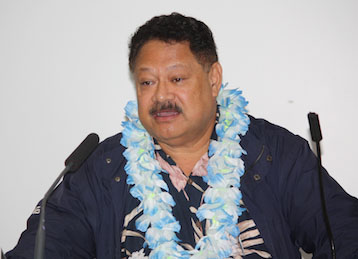
Kim Bowden
AUCKLAND: Press freedom in the Pacific Islands is under constant threat, says an industry stalwart, but the media fraternity in the South Pacific’s biggest nations take the right for granted.
Kalafi Moala, vice-chair of the Pacific’s new media freedom group PasiMA, delivered the keynote speech at today’s 2010 Pacific Islands Media Association (PIMA) conference i Auckland.
He told New Zealand journalists they took freedom of the press for granted, a luxury that was not an option for Pacific colleagues.
“For those of us who live and work in the Pacific Islands, media freedom remains a big issue,” said Moala, who is publisher and chief executive of Tonga’s Taimi Media Network.
“This is an issue we take very, very seriously because it has become a part of our life.”
The need to protect media freedom does not have the same impetus in New Zealand and Australia, which it does in the island nations of the Pacific, Moala told the conference at AUT University.
“It is not an issue in Australia and New Zealand. You seem to take it for granted.”
'Fighting losing battle'
Whereas in the Pacific, despite three decades of media engagement in protecting and promoting media freedom, Moala said they were “fighting a losing battle".
“There still continues to be infringement, especially exercised by the powers that be.”
Moala said that in Fiji, especially, media freedom was severely curbed as a result of the government’s media decree, set in place in June.
“The media has been fully muzzled by military leader and interim Prime Minister Frank Banimarama.”
Moala said Banimarama’s new media law, which deprived the people of Fiji of their freedom of expression and right to know, was not sufficiently challenged by the Pacific’s Suva-based regional body Pacific Islands News Association (PINA). This had caused frustration among members of the regional media body and was the catalyst for the creation of PasiMA.
“Since PINA has been keeping quiet about the Fiji government’s repulsive media law, its disappointed supporters and critics decided they could not remain silent anymore.”
But Moala said it was not just the hand of government blocking the right of Pacific people to a free press. Special interest groups were increasingly putting pressure on media to become “selective in their watchdog role”.
Funding chasers
Moala was especially scathing of those within the industry chasing funding dollars at the expense of media freedom.
“Sometimes we hear in the media conferences talk of funding. Funding has become to me an obnoxious word in my ear as a journalist,” said Moala.
“Everywhere you go they say ‘we need funding’ and I wonder whether this is why many times special interest groups have become so powerful in
their control of media.”
On establishing PasiMA, Moala emphasised that the organisation wanted “to be independent of donor control”.
Moala said media freedom in the Pacific was also restricted by the social and cultural fabric of the local community.
“In most places in the Pacific, the media operates within the confines of social dictates of that culture.”
Freedom of the media was not only “restricted or restrained in accordance with the conditions that are set by government but also the conditions that are set by particular cultures”, he said.
Notions of a media industry operating independent and free of the constraints of social and cultural traditions was difficult in the Pacific Islands, said Moala.
“Often the concept of media freedom was not only far more acceptable in Western culture but also operated more easily within a Western-educated social structure and conduct.”
Kim Bowden is a Postgraduate Diploma in Communication Studies student on the Asia-Pacific Journalism course at AUT University. - Pacific Scoop/Pacific Media Watch



